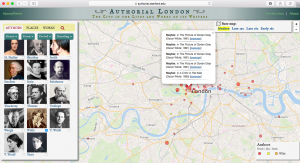Authorial London: The City in the Lives and Works of its Writers, is a site that maps the references to places in London that are made in works of writers who had lived in the city. The makers of the site, who wanted to demystify the ambiguity that sometimes surrounds the use of culturally geographical references in literature, are a group of people at Stanford University Libraries. In order to explain how this site came into being, and therefore how to reverse engineer the process, I’ll use Miriam Posner’s method of identifying the source, process, and presentation.
Source: The creaters of this site used 1600 passages from 193 works written between the 14th and 20th centuries by 47 authors from 12 literary periods. They obtained the list of London place references by reading 40 chronologically diverse texts and gathering every place mentioned within today’s Greater London area (defined by the London Orbital Motorway). They then performed an online search of the 690 text files by Authorial London writers available on Project Gutenberg. The project is an extension of “A Guide to Authorial London” which is a project by Martin Evans at Stanford University.
Process: The results from the search in Gutenberg were tagged by location, and additional locations that appeared were also recorded. The locations were entered into google maps and Nomanatim geocoding services. The web application was built with a Ruby-on-Rails and PostgreSQL database and a hybrid set of JavaScript, Leaflet/MapBox for mapping, JQuery and D3.js. ElasticSearch was used to index the entire corpus of full texts and an Apache Solr index.
Presentation: The group uses Apache Solr index of all passages for the free-text search function and google maps to present the actual visual interactive part of their data.

I wonder why there is so much ambiguity in terms of geographical references in London. Is it because it it was more often the setting of books during the time period that the researchers are studying?